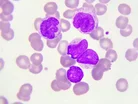FDA announces approval of gene therapy in treating leukaemia

The US Food and Drug administration (FDA) has announced the approval of the first cell-based gene therapy, something that is has described as a ‘historic action’.
With as many as 3,100 patients under the age of 20 diagnosed with acute lymphoblastic leukaemia each year, the treatment known as Kymriah has been made available to all patients under the age of 25 in an attempt to try and treat the most common form of cancer in children.
“Kymriah is a first-of-its-kind treatment approach that fills an important unmet need for children and young adults with this serious disease,” said Director of the FDA’s Center for Biologics Evaluation and Research, Peter Marks.
“Not only does Kymriah provide these patients with a new treatment option where very limited options existed, but a treatment option that has shown promising remission and survival rates in clinical trials.”
See Also:
-
CRISPR is now used to edit mutations which cause heart failure
-
GlaxoSmithKline aims to boost its financial performance with electroceuticals
The treatment process, known as CAR T-cell therapy, will be used to fight the recurrence of the B-cell where cancer has not responded to treatment or returned after initial treatment, something that occurs in approximately 15-20% of patients.
“We’re entering a new frontier in medical innovation with the ability to reprogram a patient’s own cells to attack a deadly cancer,” said Scott Gottlieb, FDA Commissioner.
“New technologies such as gene and cell therapies hold out the potential to transform medicine and create an inflection point in our ability to treat and even cure many intractable illnesses. At the FDA, we’re committed to helping expedite the development and review of ground-breaking treatments that have the potential to be life-saving.”
The trial was successful, with 83% of the 63 clinical patients treated for relapsed or refractory B-cell undergoing successful remission within three months of treatment.
Kymriah does have side effects, causing cytokine release syndrome, a systemic response to the proliferation of CAR T-cells that can cause flu-like symptoms such as a high fever, and neurological events. However, ultimately, the cell therapy could go a long way in saving hundreds of young people’s lives each year.
